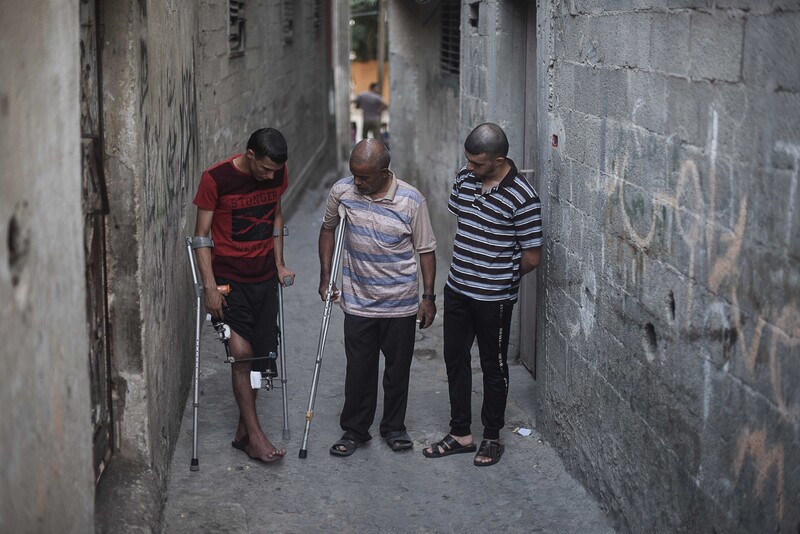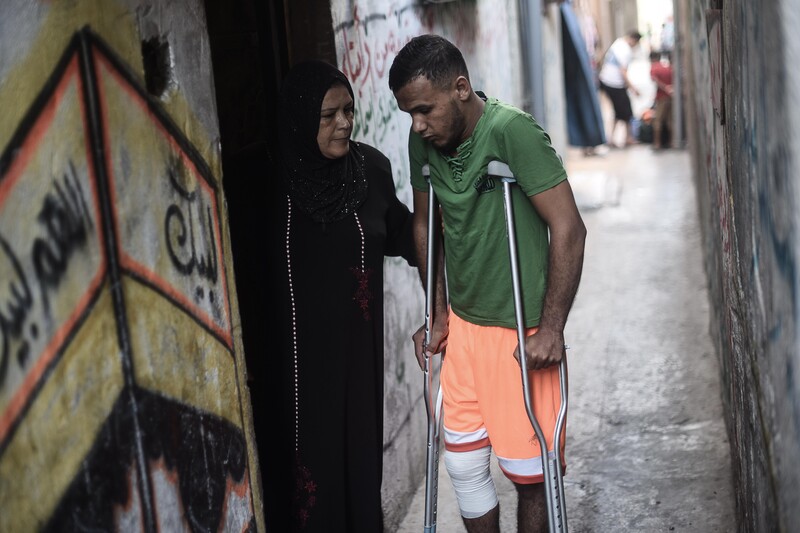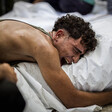The Electronic Intifada 30 July 2018

Fadel Abu al-Qusman, center, with his sons Amer (right) and Muhammad (left).
Fadel Abu al-Qumsan has survived two attacks in the past four years.
Early on 3 August 2014, Israel bombed his home in the Jabaliya refugee camp of northern Gaza. Two of his nieces and his brother-in-law were killed.
In recent months, Fadel, 53, and his family have once again been hurt by Israeli state violence.
On 6 April 2018, Fadel joined the Great March of Return to demand that Palestinians uprooted by Zionist forces in 1948 be allowed to return home.
At approximately 3 pm, he fell to the ground screaming. He had been shot in the leg by an Israeli sniper.
Fadel was roughly 700 meters from the boundary fence between Gaza and Israel at the time.
“I didn’t expect to be injured,” Fadel said. “I’m an old man and I was standing away from the fence. But it seems that Israel does not distinguish between children, young people, the elderly or women. This was a clear message from Israel that anyone who participates in the demonstrations is a target.”
The leg in which Fadel was shot had already been injured in the 1990s. The injury occurred during an accident while Fadel was a construction worker inside Israel. He has required crutches since then.
Fortunately, the bullet which hit Fadel in April this year did not cause major damage.
His 22-year-old son Muhammad, however, was subsequently shot by Israel. Muhammad was hit under the knee of his right leg with an exploding bullet on 22 June.
He remains in Gaza’s Indonesia hospital. Although Muhammad has been referred to a hospital in Turkey for further treatment, he has not yet received the full approval he needs to travel there.
“I will never forget the fear”
Muhammad’s mother Jamila described his condition as “very dangerous.” There is a possibility, she added, that an amputation will have to be carried out.
“The last four years have been the most difficult in my life,” Jamila said. “I lost my house and witnessed the deaths of three people. Now I’m suffering again because my husband and two of my sons have been injured.”
Amer, Muhammad’s elder brother, was wounded on 30 March, the first day of the Great March of Return. He was close to the boundary with Israel when a sniper shot him.
“Suddenly, I felt something burning my thigh,” Amer, 29, said. “After a moment, I fell on the ground. But, thank God, my injury was not serious. I stayed for one day in the hospital and I returned home on a crutch.”
Fifteen Palestinians were massacred that day and others have since died from their injuries. Aware that standing up to Israel is risky, Amer is determined to remain politically active.
The Great March of Return resonates strongly with his family as they originally hail from Deir Sunayd, a village about 12 kilometers from Gaza. Deir Sunayd’s population was expelled by Zionist forces when they occupied the village in 1948.
“The memory of our house being targeted in 2014 still lives with me,” said Amer. “I will never forget the fear we felt before we managed to escape. But this will not prevent me from participating in the Great March of Return and demanding my rights.”
“No comfort”
Laila Hassaballah was living just a few meters away from the Abu al-Qumsan family in 2014.
Her son Ismail – an officer in the Gaza police – was injured in the same attack. He was hit in the head with shrapnel, causing him to lose sight in one eye.
In 2016, Laila sold her jewelry and borrowed money from a relative so that Ismail could receive treatment in Cairo. It took four attempts before they eventually could travel in December of that year. The Rafah crossing on the border between Gaza and Egypt was repeatedly closed.
When they eventually reached Cairo, they had to wait two months before the surgery on Ismail’s retina could be completed. He also required counseling.
Although Laila lacked sufficient funds to cover their expenses, she remained in the Egyptian capital. The treatment proved effective. By the time they returned to Gaza in February 2017, there was considerable improvement in Ismail’s eyesight.
Now aged 30, he is studying for a master’s degree in police science at Gaza’s Ummah Open University.

Laila Hassaballah with her son Ahmad.
The family has not been spared further pain. On 20 April this year, Ismail’s brother Ahmad was shot in the right leg by an Israeli sniper while taking part in the Great March of Return.
The bullet which struck Ahmad, 25, has damaged his nerves and arteries. He is awaiting permission to visit Egypt for treatment.
With severe shortages of medicine, equipment and fuel in Gaza’s hospitals, Ahmad is unable to receive all the assistance he requires locally.
“If I stay in Gaza, I may die and never see my daughter again,” said Ahmad, referring to his 1-year-old child Fatma. “The condition of my health is getting worse every day.”
His mother, Laila, is preparing herself for the likelihood she will have to borrow money for his treatment. “I will not watch him die slowly,” she said.
“I thought that my suffering ended when I returned [from Egypt] with Ismail,” Laila said. “He’s doing well now and he’s financially supporting the family. But it seems that my suffering is just starting over again with Ahmad’s injury. Over the past four years, I have had no comfort in my life.”
“We didn’t know where to go”
During the 2014 attack on Gaza, the Israeli authorities used euphemisms to try and justify their targeting of civilians. Missile strikes described as “roof-knocking” are one such euphemism.
Through that tactic, a building was bombed as a prelude to a deadlier assault.
Omar Abu Khater was the victim of “roof-knocking.” In July 2014, an Israeli drone fired a missile at his family’s home in the Khan Younis area of Gaza.
All 19 members of his extended family who were in the two-story building at the time had to evacuate hastily. A few minutes later, the house was destroyed in a more powerful blast.
Abu Khater likens the hours following the attack to the Nakba – Arabic for catastrophe – the 1948 ethnic cleansing of Palestine. “Everyone was running around and we didn’t know where to go,” he said. “I’ll never forget those moments.”

Omar Abu Khater covering the Great March of Return protests in Khan Younis on 27 July.
Towards the end of 2016, the family received some financial assistance to rebuild their home. The aid came from Kuwait and was administered by Gaza’s public works ministry. It was only enough to reconstruct one floor.
They had to borrow heavily so that they could finish the job. As a result, the family is about $50,000 in debt.
Abu Khater, 26, works as a photojournalist with Quds Press and has documented the Great March of Return at considerable risk.
During one of the protests, a tear gas projectile hit his left leg. He required surgery on his wound but managed to resume work after a few days.
On another occasion, an Israeli sniper shot at his motorbike, causing its fuel tank to explode.
He has also been asphyxiated by tear gas – a chemical weapon which Israel has fired liberally on Palestinians – a number of times in recent months.
Abu Khater tries to find solace by remembering how he enjoyed life before the 2014 attacks. Each midday, he used to read a book and drink coffee on the roof of his house.
He still seeks a quiet spot in the reconstructed house, so that he can sit and “imagine the old days,” he said, yet he will not allow nostalgia to reduce his commitment to his work.
“Losing my house and my injuries will not stop me from covering Israeli war crimes.”
Hamza Abu Eltarabesh is a journalist and writer from Gaza.





